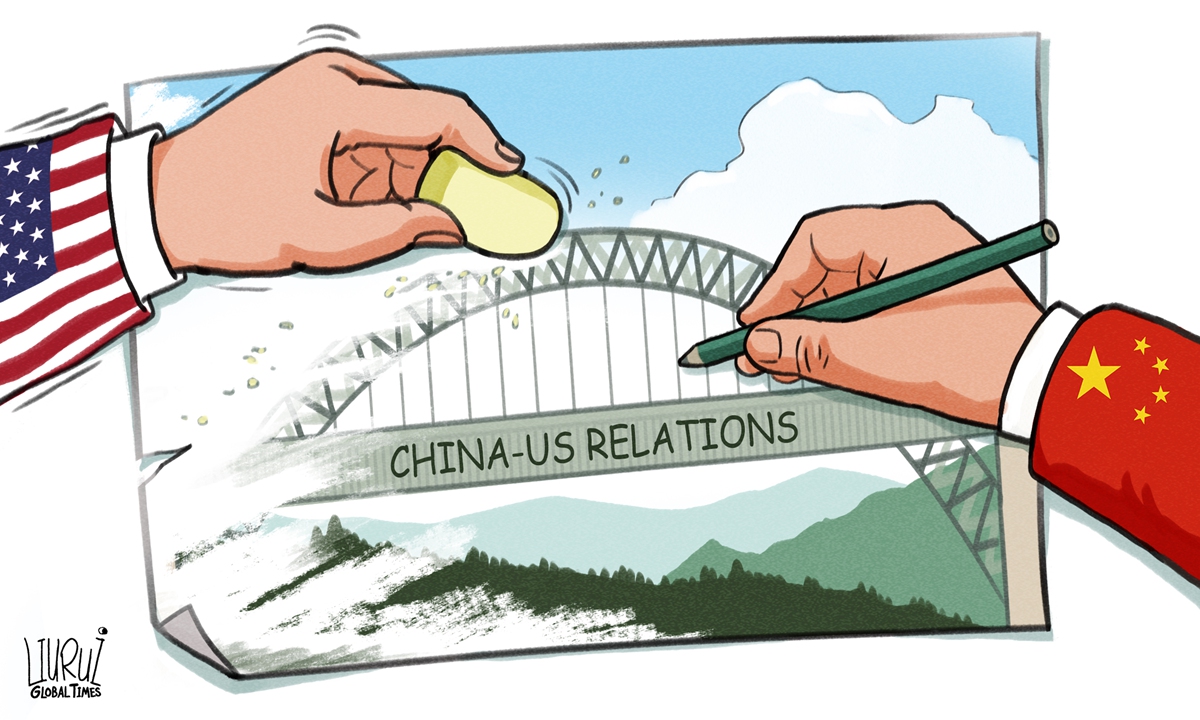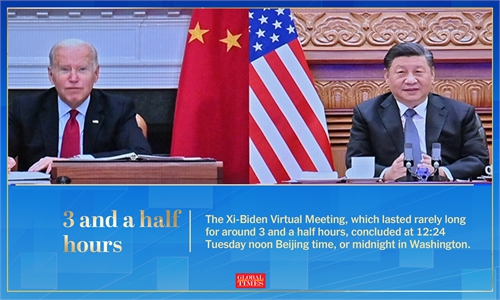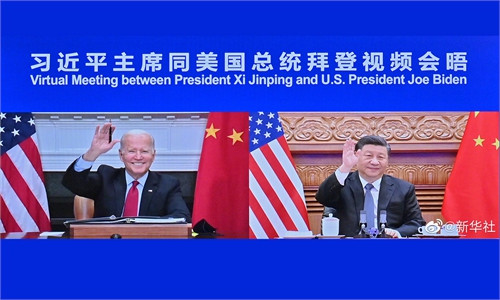China must focus on own affairs even more amid China-US de-escalation: Global Times editorial

Illustration: Liu Rui/GT
Lifting visa restrictions on each other's journalists is the first realistic outcome of the virtual meeting between the heads of state of China and the US. Jake Sullivan, US National Security Advisor, said on Tuesday that the leader-to-leader interaction should lead to a series of tasks for senior and empowered interlocutors on both sides to see where the two countries can make progress, to reduce the possibility of friction and conflict. His statement further confirms the willingness of the US to ease tensions with China.Sullivan said at the Brookings Institution, a US think tank, that there are four main concerns over the US' China policy. These are: One, the areas where China and the US need to closely coordinate because their interests align and there is urgent work to carry them forward; two, immediate challenges where the two countries have worked together historically and are now facing important moments; three, how to effectively manage differences through clear communication, such as on the Taiwan question; and four, resolving some of the remaining issues in the Phase One trade deal and use all tools available to deal with China's "non-market economic practices." The core of Sullivan's remarks was similar to Secretary Blinken's, who said that the US approach to China will be "competitive when it should be, collaborative when it can be and adversarial when it must be."
The US has repeatedly stressed that "guardrails" should be established for intense China-US competition to avoid potential conflicts. As China emphasized managing differences, such an argument was unacceptable to China since the "fierce competition" defined by the US implies the legitimization of containing and suppressing China. The "guardrails" are also a unilateral constraint on China in terms of interests of the US and its allies. In comparison, the expression of managing differences starts from a more equal point of view and requires both sides to assume obligations.
The positive evaluation of the "guardrails" is that the US feels that there is a growing risk of uncontrollable conflicts between China and the US due to growing risks brought about by excessive competition or miscalculation, so it has a clear willingness to reduce this risk. Neither country wants to slide into an unmanageable strategic collision, increasing the urgency of the leaders' meeting and the practical implementation of the outcome of the summit.
It should be noted that the alarm was sounded in the broader area of China-US relations, rather than the situation where the US has pushed China into a strategic corner. This benefited from China's effective resistance to US bullying on all fronts in recent years. It has created space for China to strategically maneuver with the US, and won its own right to speak and contest the US at ease.
US strategy to contain China has not changed, and probably will not change. But the US has slowed down the pace and adjusted the scale of pressure recently, creating room for China-US cooperation in areas such as climate change that it needs urgently. Whether this will be a meaningful shift in US policy toward China remains to be seen. The US needs to cooperate, but is still reluctant to accept reality. It still wants to emphasize its competition-based strategy. It is afraid that Washington might waiver in the future.
China has proven in the past few years that it has an endless bearing capacity. For example, most of the indicators from the trade war work in China's favor, while the COVID-19 pandemic has hit the US at its weakest point, making it less able to organize new attacks against China. Our strength continues to grow in the game, and the power gap between China and the US has been further narrowed. All this has inflicted heavy losses on the ambitions of some US political elites to use brute force to crush China in a short time or batter its growth momentum. China's route to mind its own affairs has achieved initial success, striking a blow to Washington's arrogance toward Beijing.
When Biden took office, his administration repeatedly hyped about dealing with China "from a position of strength." Compared to the historical situation, the support provided by the US position of strength today is relatively the smallest. The scale of production and share in international trade between China and the US is roughly the same. China's potential and stamina are higher than the US. Do political elites of the US still believe that they can successfully contain and transform China? The Biden administration recently said that it does not seek to change China's system. This does not appear to be simply a smokescreen to lull China.
Our conclusion is that US policy toward China is volatile and Washington's words and deeds are often inconsistent. Yet China continuing to do its own thing well is our constant trump card against the changes in the US. Doing our own thing well is China's greatest ability, and it is also our largest advantage in the game against the US. The signs of relaxation in China-US relations are worthy of our serious attention and maintenance. At the same time, the Chinese people need to remember: We can only rely on ourselves.


